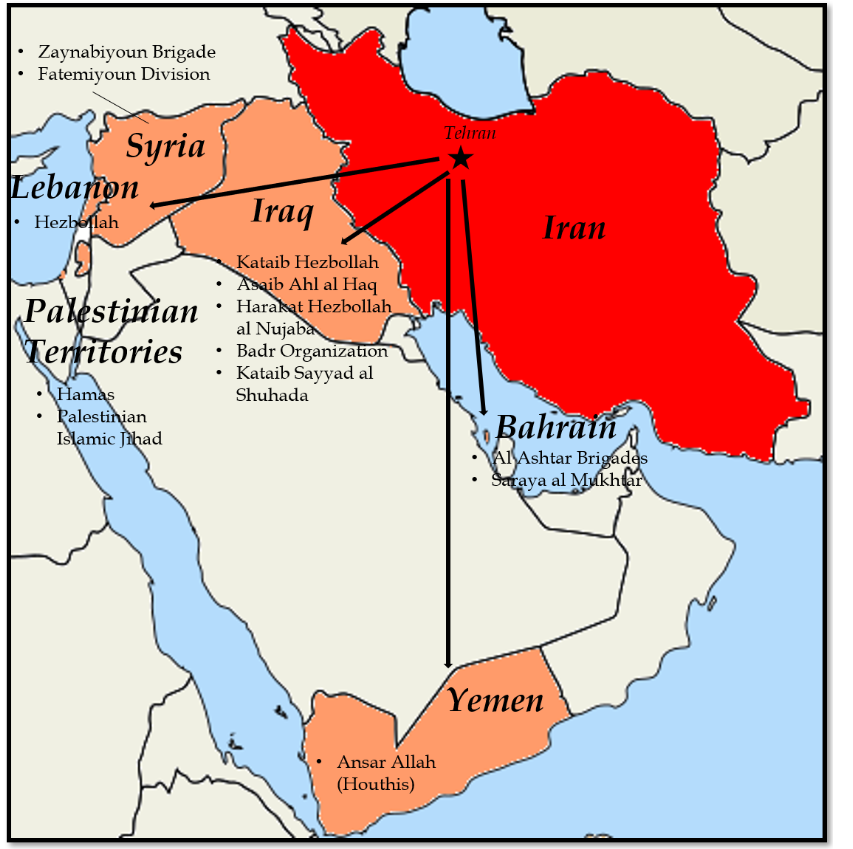
The Biden administration faces a major challenge containing Iran’s influence across the Middle East. Since the 1979 revolution, Iran has built a network of proxies. At the beginning of 2021, Tehran had alliances with more than a dozen major militias; some were affiliated with political parties that challenged local and neighboring governments. Iran’s Revolutionary Guards and the elite Qods Force have provided arms, training and financial support to militias and political movements in at least six countries:
- Bahrain
- Iraq
- Lebanon
- Palestinian territories
- Syria
- Yemen
Iraqi militias have attacked U.S.-led coalition forces that were deployed to defeat ISIS. President-elect Joe Biden has pledged to “push back against Iran's destabilizing activities, which threaten our friends and partners in the region,” he wrote in an op-ed for CNN in September 2020. The following are profiles of Iran’s proxies.
Lebanon
Hezbollah (or Party of God)
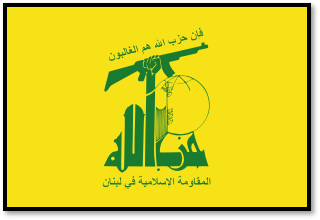 Hezbollah is a Shiite movement that was Iran’s first proxy in the Middle East. It has a militia founded in the early 1980s, with military and financial support from the Revolutionary Guards, and a political party, which first ran for office in 1992 after it emerged from the underground. In the 1980s, it carried out several suicide bombings against U.S. personnel and facilities in Lebanon and seized dozens of foreign hostages, including more than a dozen Americans. By 2020, Hezbollah had become the world’s most heavily armed non-state actor, with at least 130,000 rockets and missiles, according to the Center for Strategic and International Studies. It also held powerful positions in Lebanon’s government and economic sector.
Hezbollah is a Shiite movement that was Iran’s first proxy in the Middle East. It has a militia founded in the early 1980s, with military and financial support from the Revolutionary Guards, and a political party, which first ran for office in 1992 after it emerged from the underground. In the 1980s, it carried out several suicide bombings against U.S. personnel and facilities in Lebanon and seized dozens of foreign hostages, including more than a dozen Americans. By 2020, Hezbollah had become the world’s most heavily armed non-state actor, with at least 130,000 rockets and missiles, according to the Center for Strategic and International Studies. It also held powerful positions in Lebanon’s government and economic sector.
“Hezbollah’s budget, everything it eats and drinks, its weapons and rockets, comes from the Islamic Republic of Iran,” Hezbollah Secretary General Hassan Nasrallah said in 2016. In 2018, the Treasury Department estimated that Tehran provided Hezbollah with more than $700 million annually. In 2020, Iranian funding decreased due to U.S. sanctions, declining oil prices and the economic impact of the COVID-19 pandemic, according to Matthew Levitt of the Washington Institute for Near East Policy.
Iraq
Kataib Hezbollah (or Party of God Brigades)
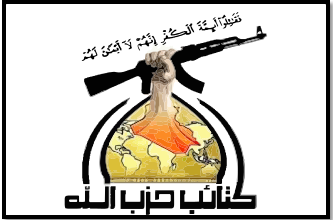 Kataib Hezbollah is a Shiite militia formed in 2007 and trained and armed by Iran’s Revolutionary Guards. In 2009, the State Department designated Kataib Hezbollah a Foreign Terrorist Organization, and the Treasury Department sanctioned its Secretary General, Abu Mahdi al Muhandis, for committing acts of violence against Coalition and Iraqi Security Forces. The United States imposed two additional rounds of sanctions on Kataib Hezbollah leadership in 2020.
Kataib Hezbollah is a Shiite militia formed in 2007 and trained and armed by Iran’s Revolutionary Guards. In 2009, the State Department designated Kataib Hezbollah a Foreign Terrorist Organization, and the Treasury Department sanctioned its Secretary General, Abu Mahdi al Muhandis, for committing acts of violence against Coalition and Iraqi Security Forces. The United States imposed two additional rounds of sanctions on Kataib Hezbollah leadership in 2020.
In 2014, the militia joined Iraq’s Popular Mobilization Forces (PMF) to fight ISIS but maintained its close ties with Tehran. “I will not shy away from mentioning the support of the Islamic Republic of Iran in terms of weapons, advising, and planning,” Muhandis said in 2018.
With Iranian backing, Kataib Hezbollah carried out the most sophisticated and effective attacks against U.S. forces and coalition allies in Iraq from 2007 to 2011 and 2018 to 2020. On December 27, 2019, it launched a rocket attack on the K1 military base near Kirkuk that killed a U.S. civilian contractor and wounded four U.S. service members and two Iraqi security forces personnel. In January 2020, the United States retaliated with a drone strike on Muhandis and Gen. Qassem Soleimani, the commander of the Qods Force, in Baghdad. It also designated its new secretary general, Ahmad al Hamidawi, a global terrorist in February 2020.
Asaib Ahl al Haq (or the League of the Righteous)
Asaib Ahl al Haq is a Shiite militia that was founded in 2006 and trained, armed, and funded by Iran’s Revolutionary Guards and Lebanon’s Hezbollah. Between 2006 and 2011, when the U.S. military withdrew from Iraq, it launched more than 6,000 attacks on U.S. and coalition forces. In 2014, it joined the government-funded PMF to fight ISIS in northern Iraq. With some 20,000 members, it became one of the largest militias in the PMF, yet it maintained operational ties with Tehran. “It is no secret that Iran supports all the militias in this area and we are obviously one of them,” Qais al Khazali, the group’s leader, said in 2015.
In January 2020, the State Department designated Asaib Ahl al Haq a Foreign Terrorist Organization. It also listed Khazali and his brother, Laith al Khazali, as global terrorists. “AAH and its leaders are violent proxies of the Islamic Republic of Iran,” Secretary of State Mike Pompeo said. “Acting on behalf of their masters in Tehran, they use violence and terror to further the Iranian regime’s efforts to undermine Iraqi sovereignty.”
Harakat Hezbollah al Nujaba (or Movement of the Party of God’s Nobles)
.jpg) Harakat Hezbollah al Nujaba is a Shiite militia founded in 2013 and trained, armed and advised by Iran’s Revolutionary Guards. Its original purpose was to support Bashar al Assad in Syria against anti-regime rebels; in 2014, it expanded its mission to fight ISIS and joined the PMF. But it continued to receive support from Tehran. “We do not hide the fact that the technical and logistical support comes from the Islamic Republic,” Akram Abbas al Kabi, the group’s leader, told Al-Monitor in 2015.
Harakat Hezbollah al Nujaba is a Shiite militia founded in 2013 and trained, armed and advised by Iran’s Revolutionary Guards. Its original purpose was to support Bashar al Assad in Syria against anti-regime rebels; in 2014, it expanded its mission to fight ISIS and joined the PMF. But it continued to receive support from Tehran. “We do not hide the fact that the technical and logistical support comes from the Islamic Republic,” Akram Abbas al Kabi, the group’s leader, told Al-Monitor in 2015.
In 2019, the State Department designated Harakat Hezbollah al Nujaba a Foreign Terrorist Organization and listed al Kabi as a Specially Designated Global Terrorist. The Treasury Department sanctioned al Kabi in 2008, prior to the group’s formation, for conducting attacks against Coalition Forces in Iraq.
Badr Organization
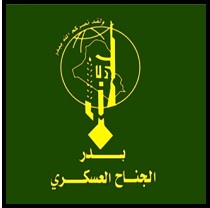 The Badr Organization is a Shiite militia formed in 1982 that has been funded, trained and armed by Iran’s Revolutionary Guards. It is the oldest and most powerful of Iran’s proxies in Iraq. Based in Iran during Saddam Hussein’s rule, it returned to Iraq after he was ousted by U.S. invasion in 2003. In 2014, it joined the PMF and was a pivotal force fighting ISIS from 2014 to 2017. It also has a political wing that has won seats in parliament.
The Badr Organization is a Shiite militia formed in 1982 that has been funded, trained and armed by Iran’s Revolutionary Guards. It is the oldest and most powerful of Iran’s proxies in Iraq. Based in Iran during Saddam Hussein’s rule, it returned to Iraq after he was ousted by U.S. invasion in 2003. In 2014, it joined the PMF and was a pivotal force fighting ISIS from 2014 to 2017. It also has a political wing that has won seats in parliament.
The U.S. government has not designated the Badr Organization, but the Treasury Department did sanction Abu Mustafa al Sheibani, the group’s former leader, in 2008. Al Sheibani left the Badr Organization in 2003.
Kataib Sayyad al Shuhada (or the Masters of the Martyrs Brigade)
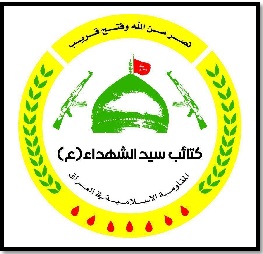 Kataib Sayyad al Shuhada is a Shiite militia founded in 2013 and funded and supported by the Revolutionary Guards. Its original mission was to support the Assad regime in Syria against a rebel uprising, but in 2014 it joined Iraq’s PMF to fight ISIS. The United States has not designated Kataib Sayyid al Shuhada a Foreign Terrorist Organization, although the Treasury Department designated Abu Mustafa al Sheibani, the group’s co-founder, a Specially Designated Global Terrorist in 2008.
Kataib Sayyad al Shuhada is a Shiite militia founded in 2013 and funded and supported by the Revolutionary Guards. Its original mission was to support the Assad regime in Syria against a rebel uprising, but in 2014 it joined Iraq’s PMF to fight ISIS. The United States has not designated Kataib Sayyid al Shuhada a Foreign Terrorist Organization, although the Treasury Department designated Abu Mustafa al Sheibani, the group’s co-founder, a Specially Designated Global Terrorist in 2008.
Imam Ali Brigades
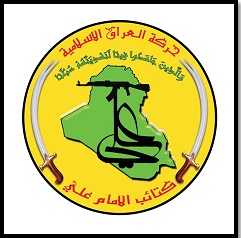 Kataib Imam Ali (KIA), or the Imam Ali Brigades, was established in June 2014. It operates primarily in Iraq but has also dispatched fighters to Syria. Its members have trained in Iran and with Hezbollah in Lebanon. Iranian and Lebanese Hezbollah advisers have also worked with the PMF inside Iraq. Within months of its creation, KIA joined the PMF as the 40th brigade; it battled the Islamic State alongside other PMF brigades in Amerli, Tuz, Diyala, Mosul and Tikrit. General Soleimani was on the frontline of the Tikrit offensive with KIA fighters several times.
Kataib Imam Ali (KIA), or the Imam Ali Brigades, was established in June 2014. It operates primarily in Iraq but has also dispatched fighters to Syria. Its members have trained in Iran and with Hezbollah in Lebanon. Iranian and Lebanese Hezbollah advisers have also worked with the PMF inside Iraq. Within months of its creation, KIA joined the PMF as the 40th brigade; it battled the Islamic State alongside other PMF brigades in Amerli, Tuz, Diyala, Mosul and Tikrit. General Soleimani was on the frontline of the Tikrit offensive with KIA fighters several times.
The group’s platform advocates “mercy, tolerance and courage,” but KIA has been accused of brutality against IS fighters —including torture, murder, and setting people afire. Although predominantly Shiite, the Imam Ali Brigades established and trained a small militia of some 300 Syriac Christians called Kataib Roh Allah Issa Ibn Miriam, (or The Brigade of the Spirit of God Jesus Son of Mary) in December 2014.
Yemen
Ansar Allah (or the Houthis)
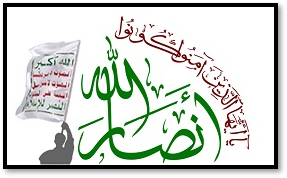 Ansar Allah is a Zaydi Shiite movement founded in the early 1990s that has fought the Yemeni government since 2004. The Houthis captured Yemen’s capital, Sanaa, in 2014 and helped oust President Abed Rabbo Mansour Hadi’s government in 2015. They have been supported by the Revolutionary Guards since at least 2011; Iran and Lebanese Hezbollah expanded training and increased arms shipments and arms after a Saudi-led coalition intervened in Yemen’s war in 2015.
Ansar Allah is a Zaydi Shiite movement founded in the early 1990s that has fought the Yemeni government since 2004. The Houthis captured Yemen’s capital, Sanaa, in 2014 and helped oust President Abed Rabbo Mansour Hadi’s government in 2015. They have been supported by the Revolutionary Guards since at least 2011; Iran and Lebanese Hezbollah expanded training and increased arms shipments and arms after a Saudi-led coalition intervened in Yemen’s war in 2015.
The United States sanctioned two senior Houthi military commanders in 2014 and the Ansar Allah founder, Abdul Malik al Houthi, in 2015. In January 2021, the Trump administration announced that it would designate the movement as a Foreign Terrorist Organization. The Biden administration revoked the sanctions designation on February 16 but kept sanctions in place for three Houthi leaders.
Syria
Zaynabiyoun Brigade
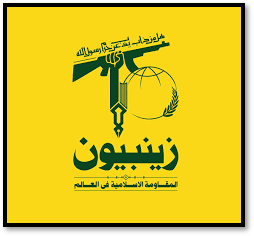 The Zaynabiyoun Brigade is a Pakistani Shiite militia established in 2014 by the Revolutionary Guard Corps and trained by the Qods Force. It has recruited among Pakistanis living in Iran as well as from Pakistan’s tribal areas. It has fought with the Assad regime’s forces in Syria.
The Zaynabiyoun Brigade is a Pakistani Shiite militia established in 2014 by the Revolutionary Guard Corps and trained by the Qods Force. It has recruited among Pakistanis living in Iran as well as from Pakistan’s tribal areas. It has fought with the Assad regime’s forces in Syria.
In 2019, the Treasury Department sanctioned the Zaynabiyoun Brigade for supporting the Qods Force and human rights abuses in Iran. “The brutal Iranian regime exploits refugee communities in Iran, deprives them of access to basic services such as education, and uses them as human shields for the Syrian conflict,” Treasury Secretary Steven Mnuchin charged.
Fatemiyoun Division
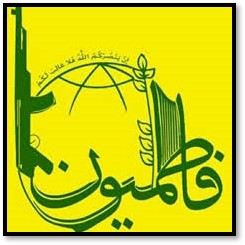 The Fatemiyoun Division is an Afghan militia founded in the 1980s that went dormant in the 1990s and was revived by Iran’s Revolutionary Guards in 2012. It is primarily made up of Hazara refugees from Afghanistan living in Iran. Since 2014, Iran’s Revolutionary Guards have deployed the militia to fight for the Assad regime in Syria. In 2017, some 50,000 Afghans were deployed in Syria.
The Fatemiyoun Division is an Afghan militia founded in the 1980s that went dormant in the 1990s and was revived by Iran’s Revolutionary Guards in 2012. It is primarily made up of Hazara refugees from Afghanistan living in Iran. Since 2014, Iran’s Revolutionary Guards have deployed the militia to fight for the Assad regime in Syria. In 2017, some 50,000 Afghans were deployed in Syria.
The Treasury Department sanctioned the Fatemiyoun Division in 2019 for supporting the Qods Force and engaging in human rights abuses in Iran. It claimed that Iran had coerced Afghan refugees to fight in Syria or face imprisonment in Iran or deportation to Afghanistan.
Bahrain
Saraya al Ashtar (or the Al Ashtar Brigades)
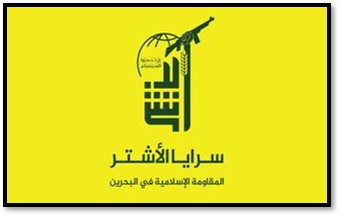 The Al Ashtar Brigades is a militant group based in Bahrain funded, trained and armed by Iran. The State Department charged that it has committed terrorist attacks in Bahrain to overthrow the government. In 2014, the group killed two Bahraini police officers and one Emirati officer in a bomb attack.
The Al Ashtar Brigades is a militant group based in Bahrain funded, trained and armed by Iran. The State Department charged that it has committed terrorist attacks in Bahrain to overthrow the government. In 2014, the group killed two Bahraini police officers and one Emirati officer in a bomb attack.
The Treasury Department designated two of Al Ashtar Brigade’s leaders global terrorists in March 2017. The State Department designated it a Foreign Terrorist Organization in July 2018. Al Ashtar is “another in a long line of Iranian sponsored terrorists who kill on behalf of a corrupt regime,” Nathan Sales, the State Department coordinator for counterterrorism, said in 2018.
Saraya al Mukhtar
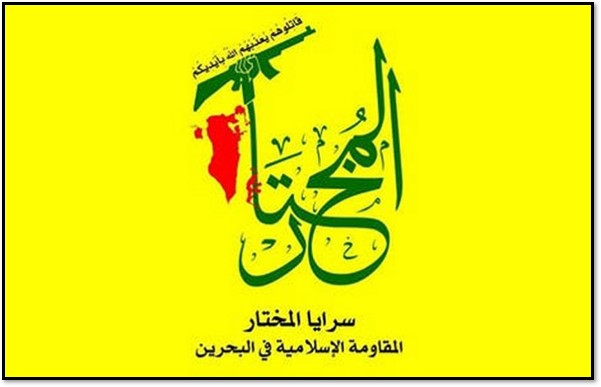 Saraya al Mukhtar is a militant group based in Bahrain funded and supported by Iran. The State Department charged that it plotted attacks against U.S. personnel in Bahrain and offered cash rewards for the assassination of Bahraini officials. Saraya al Mukhtar’s goal is to overthrow the monarchy.
Saraya al Mukhtar is a militant group based in Bahrain funded and supported by Iran. The State Department charged that it plotted attacks against U.S. personnel in Bahrain and offered cash rewards for the assassination of Bahraini officials. Saraya al Mukhtar’s goal is to overthrow the monarchy.
The State Department designated it a Specially Designated Global Terrorist in December 2020.
Palestinian Territories
Hamas (or the Islamic Resistance Movement)
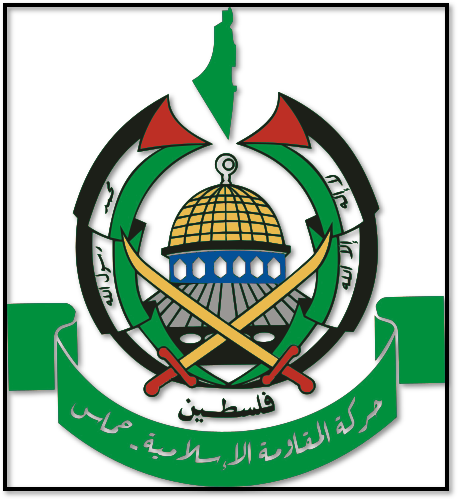 Hamas, or Harakat al Muqawama al Islamiyah, is a Sunni Islamist militia and political party based in Gaza that has reportedly been funded, armed and trained by Iran’s Revolutionary Guards since the early 1990s. Hamas opened an office in Tehran in the 1990s. The U.S. government sanctioned Hamas in 1995, designated it a Foreign Terrorist Organization in 1997 and named it a Specially Designated Global Terrorist in 2001. It has also imposed multiple rounds of sanctions on 21 senior leaders and operatives.
Hamas, or Harakat al Muqawama al Islamiyah, is a Sunni Islamist militia and political party based in Gaza that has reportedly been funded, armed and trained by Iran’s Revolutionary Guards since the early 1990s. Hamas opened an office in Tehran in the 1990s. The U.S. government sanctioned Hamas in 1995, designated it a Foreign Terrorist Organization in 1997 and named it a Specially Designated Global Terrorist in 2001. It has also imposed multiple rounds of sanctions on 21 senior leaders and operatives.
In 2012, Iran cut off funding to Hamas after it refused to support the Assad regime in the Syrian civil war. Iran resumed financial assistance to Hamas in 2017. “Relations with Iran are excellent and Iran is the largest supporter of the Izz ad Din al Qassam Brigades with money and arms,” Yahya Sinwar, a senior Hamas military leader, said in 2017. Iran has provided more than $100 million annually to Palestinian groups, including Hamas and Palestine Islamic Jihad, the State Department reported in 2020.
Palestinian Islamic Jihad (or Harakat al Jihad al Islami al Filistin)
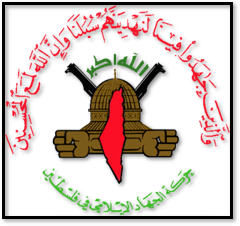 Palestinian Islamic Jihad is a Sunni Islamist militant group in Gaza funded, trained and armed by Iran since the late 1980s. Although based in Damascus, it has long maintained an office in Tehran. The United States first sanctioned Palestinian Islamic Jihad in 1995 for disrupting the Middle East peace process and designated it a Foreign Terrorist Organization in 1997 for committing terrorist acts that threaten U.S. interests and national security.
Palestinian Islamic Jihad is a Sunni Islamist militant group in Gaza funded, trained and armed by Iran since the late 1980s. Although based in Damascus, it has long maintained an office in Tehran. The United States first sanctioned Palestinian Islamic Jihad in 1995 for disrupting the Middle East peace process and designated it a Foreign Terrorist Organization in 1997 for committing terrorist acts that threaten U.S. interests and national security.
Iran provided more than $100 million annually to Palestinian groups, including Hamas and Palestine Islamic Jihad, the State Department reported in 2020. “The Palestinian Islamic Jihad is another fruit of the Ayatollah Khomeini’s fructuous tree,” Secretary General Ramadan Shallah said in 2002. Iran reportedly cut off funding to the group in May 2015 because it did not support Tehran’s involvement in Yemen. It renewed funding in May 2016.
This article draws on articles by Ashley Lane and Garrett Nada.
